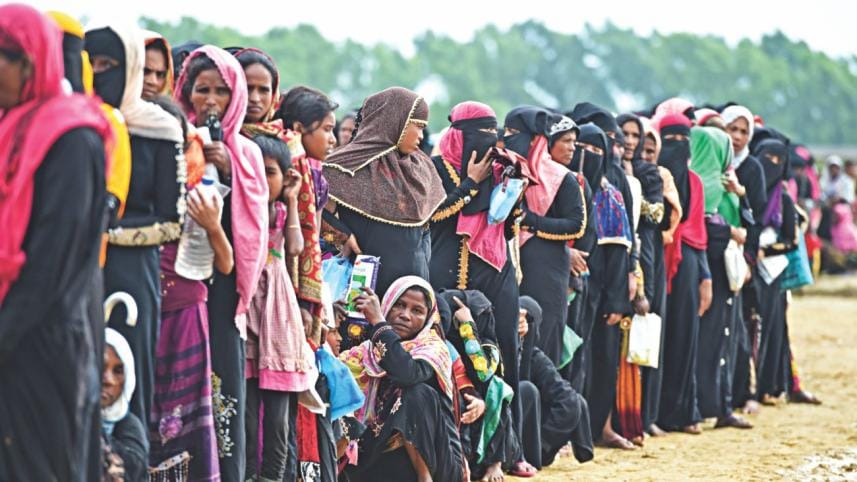Rohingyas' dignified return to their homeland

Negotiat-ions are ongoing between the governments of Bangladesh and Myanmar to formulate a plan to repatriate the Rohingyas who have sought refuge in Bangladesh fleeing the atrocities perpetrated by the Myanmar military. The major point of contention between the two governments is most likely to be the criteria for deciding who is eligible to be repatriated and who is not, i.e. the standard of proof that an individual was a legitimate inhabitant of Rakhine State in Myanmar.
The Myanmar government no doubt intends to set strict criteria so as to deny repatriation to as many Rohingyas as possible. Since the citizenship law in Myanmar disenfranchises the Rohingyas by denying them citizenship, it is quite unlikely that they would be able to produce any credible document to prove that they are former residents of Rakhine. Further aggravating this problem is the fact that most of the refugees while fleeing the atrocities have left everything behind in Rakhine and many of their homes and villages have been burned to the ground. Therefore, the issue of setting the appropriate criteria of eligibility would be a major impediment to the finalisation and successful implementation of a repatriation plan.
Myanmar could also intentionally drag on the negotiations until the issue loses relevance thus prolonging the crisis. Bangladesh and the international community must continue to exert pressure with increasing intensity on the government of Myanmar to resolve the crisis.
The aim of this piece is to explore whether the repatriation of the Rohingyas to Myanmar in and of itself would effectively resolve the crisis in the long-term from the perspective of Rohingyas and Bangladesh. Although the best possible means to resolve the crisis still seems to be the establishment of a United Nations Interim Administration in Rakhine, an agreement between the governments of Bangladesh and Myanmar supported by the international community may be able to successfully resolve the crisis.
From the perspective of Rohingyas and Bangladesh, any plan of action or agreement must ensure that the Rohingyas are duly conferred citizenship of Myanmar and accorded rights and treatment as legitimate citizens, so that they can rebuild their lives in Rakhine, and the assurance that the Myanmar government would never engage in another such brutal campaign is also necessary. Without these guarantees, it is highly likely that the Myanmar military may restart its ethnic cleansing campaign with greater intensity as and when the pressure from the international community eases and it may inconspicuously and strategically continue to depopulate Rakhine State of the Rohingyas so as not to draw attention to its atrocities.
Rohingyas have been seeking refuge in Bangladesh since the 1980s and Bangladesh couldn't do much about it. A steady trickle of refugees over decades does not garner the same reaction or sympathy in the international community as does a mass exodus in the short span of two months. Therefore, in the future, steady streams of Rohingya refugees from Myanmar will not muster enough international support to stop Myanmar's depopulating campaign.
Therefore, an agreement which only deals with the issue of repatriation but does not guarantee the rights, safety, and security of the Rohingyas will not "resolve" the crisis and risks its recurrence in the future. In order to conclusively resolve the crisis and ensure peace, the agreement should not only deal with repatriation but also rehabilitation of the Rohingyas in Rakhine State, restitution of their lands, their reintegration into society and politics, and of course, grant of citizenship and all the complementary rights. The agreement must guarantee humanitarian aid agencies and organisations, including the United Nations, unfettered access to Rakhine State. It must also establish an international commission which will oversee and monitor full implementation of the agreement and ensure that the international community continues to be a stakeholder in the process, so that on the off chance that the agreement falls through, the international community will have a responsibility to act accordingly.
It needs to be understood that, at present, Myanmar is being given a bitter pill to swallow. As such, it is up to Bangladesh and the rest of the world to ensure that it cures the Rohingyas of their plight. As long as Rohingyas are persecuted in Myanmar, Bangladesh will continue to bear the brunt.
Farhaan Uddin Ahmed is a researcher of international law and legal theory, and lecturer at the School of Law, BRAC University.
Email: farhaan17@gmail.com




 For all latest news, follow The Daily Star's Google News channel.
For all latest news, follow The Daily Star's Google News channel.
Comments